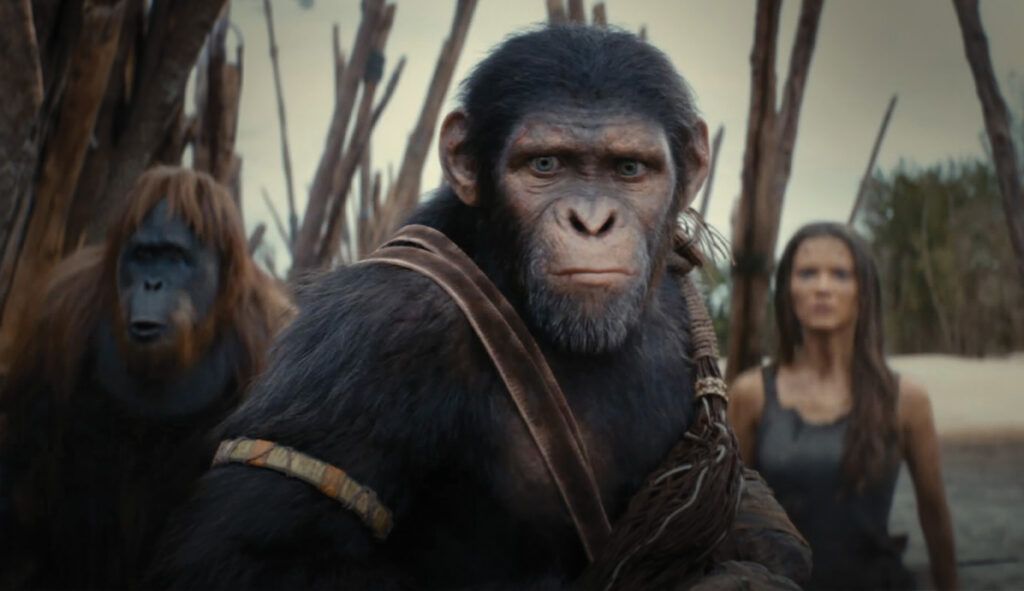
The reboot series that began with 2011’s Rise of the Planet of the Apes is one of the very few postmillennial retreads that justified itself. Planet of the Apes, the classic 1968 thought experiment about a simian genocide of the human race and the victim of a forgettable 2001 Tim Burton remake, became the inspiration for one of the great achievements in 21st century American popular filmmaking. Rise of the Planet of the Apes, Dawn of the Planet of the Apes, and War for the Planet of the Apes, which made a combined $1.7 billion at the box office, were colossal action thrillers that raised the big questions of human nature and toyed with our deeper suspicions of human transience without being too much of a bummer about the whole thing.
Like Twilight Zone auteur Rod Serling, the cultural prophet who wrote the initial screenplay to the 1968 original, series overseers Amanda Silver and Rick Jaffa understood that an apocalyptic fantasy loses its power if it ever seems too serious — or if it’s not serious enough. In the 1968 Planet of the Apes, the main apocalyptic error under examination is racism. The astronaut Charlton Heston, a symbol of American civilizational hubris, crash-lands on a planet where the slaves have replaced their masters and a courageous, muscular white man is treated as a freakish outsider. Apes was Serling’s final attempt to literalize the insanities of a zero-sum notion of human existence. In the reboot trilogy, humanity is doomed by a not-unrelated flaw. As a plot review in the opening screen of the newly released Kingdom of the Planet of the Apes puts it, a “man-made virus” meant to turn apes into our quasi-intelligent helpmates instead kills nearly every human being while “robbing [the survivors] of their intellect and their ability to speak.” In the ’60s, an unreconstructed belief in our superiority will destroy us. In the new millennium, it’s humanity’s ambition to bust through moral guardrails and master the physical world that will reduce the species to mute idiocy.

The franchise’s last entry, 2017’s War for the Planet of the Apes, concluded in this queasy suicide of human reason, with man and ape trading roles in the natural order. In Kingdom, which takes place hundreds of years later, we find out the monkeys haven’t done much with their human-free paradise. Our hero, Noa, lives in a nonliterate society of gentle apes who train eagles to hunt for them and dwell among the overgrown ruins of a civilization everyone’s forgotten and indeed has no curiosity about. Even Raka, the wisest of all apes and the only ape in the movie who can read, informs Noa that a terminal at what used to be Los Angeles International Airport was probably a facility where apes could care for humans, to make sure the stupid beasts’ material needs were met. Its construction was undoubtedly an act of the compassionate Caesar, liberator of the apes, protagonist of the prior three films, and the now-mythological Lawgiver who, Raka says, “taught us what it means to be ape.” The now-vanished and bastardized Caesarian thought system taught that coexistence with the human scavengers was important to ape self-knowledge, though even Raka can’t remember why. Noa, meanwhile, doesn’t even know who Caeser is.
The intellectually and technologically backward wuss apes of Eagle Clan are not the only apes on this planet, thank the Lawgiver. A couple of valleys over is Proximus Caesar, a great ape of history and an enlightened despot who claims to be the rightful heir to the Caesarian project, whatever that is. Per Proximus, Caesar believed apes should dominate the Earth, however many ape or human dead it takes. In a world where no one can read and history doesn’t exist, there aren’t many apes around who feel inclined to argue with him. With the help of a rare talking and thinking human being who’s immune from the virus, Proximus has determined, with some justification, that the Planet of the Apes lacks the conditions for a rational labor market, meaning that civilization can only progress through mass coercion and rapid technological advancement. Exhibiting a keenly unsentimental understanding of how states and societies form, Proximus declares himself king, enslaves the wuss apes, and puts them to work busting through a vault of ancient human weaponry.
Did the long-ago Caesar want a stagnant yet decent world of interspecies harmony or one where apes were self-assured, brutally enlightened, and hostile toward those wily humans, however few of them are left with their brains intact? Sapient minds may differ. Nonetheless, the movie, whose screenplay was largely written before 2020, commits a number of satisfying heresies against the adjustments that correctness-minded Hollywood types have made to their view of reality between 2020 and now: The action begins with a lab leak, the evil of Proximus’s Nietzschean apes is denoted through their wearing masks, and we are in a dystopia where nobody reads or knows anything, making historical memory both seamless and necessary to manipulate. Imagine living in such an awful world!
There is a welcome diagnosis of our present manias buried in Kingdom, though a 145-minute CGI film is an oddly unself-aware vehicle for a movie that takes an overall negative view of the eclipse of the human. This being 2024, it doesn’t give much away to note that nature still beats civilization in this particular film, as it did back on Endor and in FernGully, as well as on whatever the Avatar planet is called. Surely the bird-loving forest folk are Good and the people bearing technology and organized political and military institutions are Bad.
CLICK HERE TO READ MORE FROM THE WASHINGTON EXAMINER
Once we make it to the climactic battle between Noa and Proximus over the apes’ Caesarian inheritance — over what it means to be ape or human or whatever; the metaphors get a little mixed after 10 whole films of this stuff — we’re reminded for the umpteenth time that civilization itself might not be worth it and we should probably just return to our treehouses and grottoes before it’s too late. Serling didn’t believe this: His Planet of the Apes was an enlightened republic where science and argument were valued. Dr. Zaius wasn’t a chest-thumping simpleton but a simian Socrates, leading his student Heston on a quest of tragic self-discovery that ends with the final human kneeling before unmistakable proof that he’s the real brute and the torch of civilization has passed to what he arrogantly believed to be his inferiors.
Nine films later, Kingdom suggests that the franchise is finally too derivative, and too cynical, to reach anything like this former level of terrible insight.
Armin Rosen is a New York-based reporter at large for Tablet.






